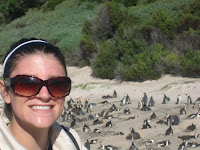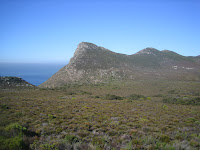Kelly and I got lost today. It was raining, and we had faulty directions and we got lost. We were supposed to be heading to this place called Spier in the winelands, where they have a little cheetah sanctuary. The whole point was to see the winelands, even though none of the wineries were open, and then end up at this place. Well... that took about two hours because we ended up back near the airport in a colored area that all the farmworkers live in (not so nice) and then back in Stellenbosch (the big "town" of the winelands). It was quite the trip, and we ended up at Spier as well as seeing a farm with a pack of wildebeest, some springbok (funny that you should mention that, Auntie Lorrie), a few ostriches and some cattle. It was a very uneventful day, but nice to be able to see more even though it rained all day.
Tomorrow I head to Khayelitsha (pronounced kai-a-leet-sha) for a night. Khayelitsha is the largest township in Cape Town and the second largest in all of South Africa. It is also in particularly bad shape, if it is even possible to compare the quality of almost nothing. I am staying with a woman who has created a B&B for tourists, so that instead of touring a township on bus and treating the residents as zoo animals they could actually experience life there. As you might imagine, I probably will not be able to post again until Monday or Tuesday, as Monday I have a long bus ride to Plettenberg Bay along the Garden Route. I'm not even sure that I'll have internet again until I get back to my guesthouse in Cape Town, but I'm hopeful.
Now let me clarify a few things for you, as I realize very few people know the history of South Africa and what I'm talking about...
A government system known as apartheid (Afrikaans for "separateness") was installed in South Africa in 1948. Its basic tenet was that the South African races should (1) live separate and (2) they should be treated on a caste system. The minority whites held the highest position in this system- the lived in the best areas, were allowed the most education, had the best jobs. They were essentially treated as first class citizens. Then there were the Indians, who did not hold as high of a position as the whites, but had a adequate standard of living. The coloreds (mixed races) were next, and were segregated to colored townships where they could only works in certain jobs and attain a certain level of education. While they were packed together in small areas with lots of flats and small houses, they did have roofs over their heads and food to eat. Blacks were considered the savages of the country, and they were alloted fields to live in and little or no employment or education. These fields then developed into black squatter camps and shanty towns, and some permanent housing. Whites, Indians, coloreds and blacks were all made to live apart from one another as part of the Group Areas Act. While the apartheid system was finally dismantled in 1994 (when South Africa had their first democratic election and Nelson Mandela was elected president), much of this segregation remains. Sometimes it is by choice- a person's family or job keeps them there. Most of the time, though, it is for lack of employment and education. While there is a small middle class developing in the country, the poor tend to remain poor while the rich tend to remain rich. The government is trying to give as many people housing as is possible, but change is a slow process and requires a lot more than the government can currently give.
As another quick aside, having nothing to do with townships, baboons are incredibly dangerous animals. They look all cute and fun, but they are far stronger and meaner than any man. Visitors to the Cape Peninsula started feeding the baboons years ago, and since then the baboons have been conditioned to believe that humans carrying food are fair game. It's rather interesting, as well, because this particular species of baboons generally has a diet that consists mainly of shellfish, which they will roam the beaches for as the tides move out. If you don't carry food, they really want nothing to do with you. They may sniff you, but will move on. I had one about 18 inches away from me, and it had absolutely no interest. I, on the other hand, was terrified because it's hard to realize how predatory these animals actually are until one is walking straight at you with that evil little stare.
Anyway, a new day ahead of me tomorrow and most certainly a new experience. I will post as soon as I can, and definitely with pictures so that maybe you can take note of what the majority of the world is really like.
Love you all.









































